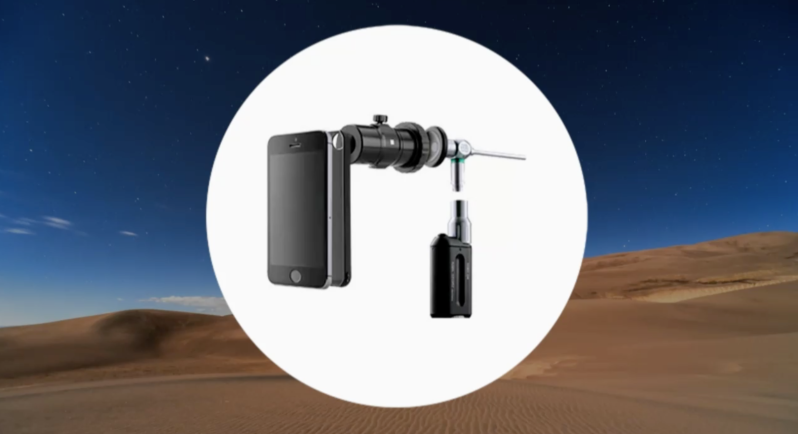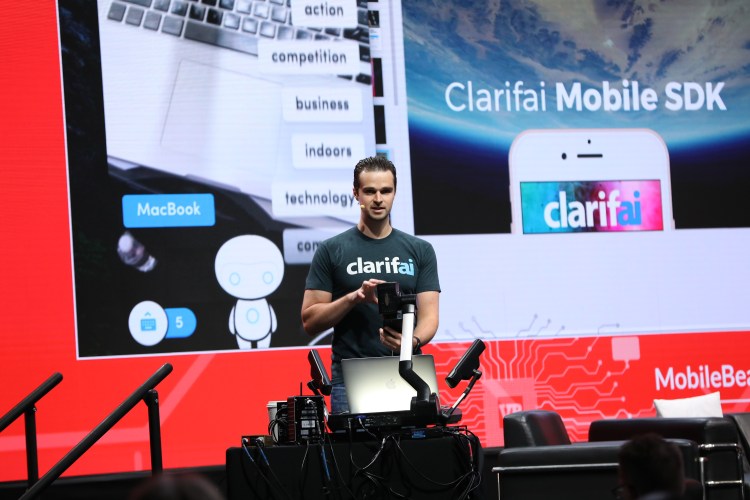Watch all the Transform 2020 sessions on-demand here.
Computer vision startup Clarifai has launched a mobile software development kit (SDK) in limited preview today to process and carry out artificial intelligence on iOS devices. Versions for Android and Internet of Things devices are also in the works.
The news was announced onstage today by Clarifai founder Matt Zeiler at MB 2017, a gathering of AI and bot industry innovators being held at Fort Mason in San Francisco, California.
The news is significant because it allows mobile users to carry out AI computations — even on their iPhone without a connection to the cloud, which is typically how machine learning is handled on mobile devices today. Computer vision that requires no internet connection will be useful for mobile app developers and users in parts of the world where internet speed or connections aren’t reliable.
“This network effect of all the users and all the devices users are using connected to our cloud, that’s going to be the distributed training infrastructure, which is really exciting because when you think about it, the number of servers that even the biggest companies like Google have that is very tiny compared to the number of mobile devices on the planet. And so we want to leverage that to get outside of the data center and really tap into the knowledge of everybody on the planet,” Zeiler said.
June 5th: The AI Audit in NYC
Join us next week in NYC to engage with top executive leaders, delving into strategies for auditing AI models to ensure fairness, optimal performance, and ethical compliance across diverse organizations. Secure your attendance for this exclusive invite-only event.
Though no internet connection is necessary for the SDK to operate, use of Clarifai in the cloud will allow a user to synchronize or share their AI trained to recognize specific objects, faces, or pets.
Clarifai hopes its computer vision models combined with the mobile SDK will be adopted to tackle use cases in many industry verticals, but one early partner already using the mobile SDK is medical imaging company i-Nside. The company has built a device that fits on the back of smartphones that looks inside people’s ears to detect specific diseases. Images taken by the company over the years have been used to train AI models, and now the SDK will allow doctors and medical professionals to process images and check for disease without potential privacy violations or the need for a data center or internet connection.
“We’re very excited about this, combined with the combination to train it, because every different country, every different population is going to have different diseases, they’re going to have different proportions of diseases, and so each of these devices can learn their own model to be able to recognize what’s important in that area,” Zeiler said.

The SDK can be used not just for running AI models but also for training them. Clarifai launched its custom training and image search service last fall. The service can also go beyond labeling faces or objects for a personalized experience on your iOS device.
“Image recognition is often talked about in terms of object recognition, like ‘this is a chair and a table and a dog,’ but it doesn’t have to be something like an object, it can be something like a preference or an intent and the mobile SDK can actually learn that on each device,” he said. “So for example if I share dog pictures with my wife all the time, hitting share with Lisa can be learned and so the next time I have a dog picture and I hit the share button, it recommends Lisa as the top person to share with.”
Clarifai launched in 2013, prior to being named winner of the ImageNet contest, an annual competition to recognize 1,000 categories of images with computer vision. In 2015 Clarifai expanded its visual analysis beyond images to include video. The highly sought-after startup has turned more than a dozen acquisition attempts by tech giants, Zeiler recently told Reuters.
Last fall, Claifai raised $30 million to grow its team in a round led by Menlo Ventures with participation from Union Square Ventures, Qualcomm, and Lux Capital.


